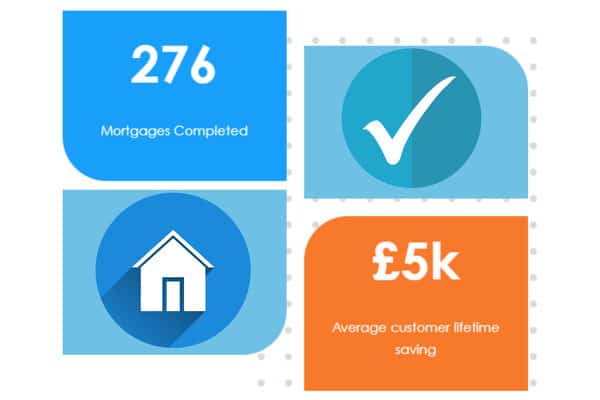Self Employed Mortgage Lenders
Mortgages that work for you when you work for yourself.
With Jones & Young, we have helped to deliver industry-leading mortgages to self-employed customers for over 10 years.
As Seen In





Company Accounts
We have access to High Street Lenders that will use your share of net profits and your renumeration to calculate the amount you can borrow.
This often saves Limited Company Directors having to pay higher personal tax bills in order to secure a mortgage.

1 years accounts
Most lenders average the last 2 years accounts but there are some that use the latest years figures for affordability purposes.
If you are a newly formed company there are lenders that will accept 1 years trading history.

Salary & Dividends
The most common income evidence a company director is asked for is the the last 2 years salary and dividends of which an average is taken.
Some lenders will use the latest year which can help, or consider your company's retained profits.

CIS and Contractors
If you are in the construction industry and get paid via the CIS scheme then we can use your CIS statements as payslips. This means you can be tax efficient and still get the mortgage you deserve.
If you are a day rate contractor then we can use that daily rate rather than your taxable income.

Welcome To Jones & Young Mortgages
Welcome to Jones & Young Mortgages, where your journey to securing the right mortgage as a self-employed business owner begins. With our specialist mortgage advisers at the helm, you’ll benefit from a wealth of expertise gained over decades of assisting individuals like you.
As a specialist advisers, we understand the intricacies of your unique financial situation. We fully understand how each lender differs in the way they consider your income and are able to present your income to potential lenders in the best possible way, the way we know will get the result you need. As a self employed business owner we’ll consider if its best to use salary, dividends, net profits, or retained earnings within your limited company, and we can navigate these complexities effectively. The assessment includes considerations like net profits before or after taxation for limited companies, net profits for sole traders, or if you are a contractor your daily or hourly rate.
One of the standout advantages of working with us is our access to specialist lenders who recognise the value of your retained profits as income, allowing for greater lending capacity and allowing you to remain as tax efficient as possible. Additionally, we understand that traditional lenders often require a two-year average of accounts for affordability assessment. As a whole of market broker we have a number of lenders that will allow just one year’s accounts, so even if you’ve been trading for only a year it is still possible to obtain the mortgage you deserve.
Our track record speaks volumes, successfully aiding numerous customers like you. At Jones and Young Mortgages, we pride ourselves on offering a comprehensive, independent, whole-of-market approach. We often have access to exclusive rates ensuring you can access mortgage deals you require promptly, with minimal delays, and a higher level of reliability. Your journey to securing the mortgage you deserve starts here.
10+ Years as a Mortgage Advisor
Self-Employed Mortgage Specialist
Whole of Market
Access
As a specialist lender and self-employed mortgage broker, we see things differently, let us find the perfect mortgage for you.
Unlock The Mortgages You Deserve
With over a decade of expertise, Jones & Young Mortgage advisers specialise in assisting self-employed individuals, just like you, access the best mortgage lenders and solutions they require. If previous attempts to secure a mortgage have proven challenging, we can offer a potential solution that could make all the difference.
What Are Mortgage Lenders?
Mortgage lenders are financial institutions or companies that provide loans to individuals or businesses for the purpose of purchasing property.
These loans, commonly called mortgages, are typically used to buy homes, commercial properties, or land. Mortgage lenders play a pivotal role in the housing market by offering borrowers the necessary funds to purchase property. In return, borrowers must repay the loan amount and interest over a specified period, usually spanning several years. Mortgage lenders can be banks, building societies, credit unions, or specialised mortgage companies.


Can Self-Employed People Get A Mortgage?
Yes, self-employed individuals can indeed secure a mortgage, but the process may differ from that of salaried employees.
Mortgage lenders have specific requirements for self-employed borrowers to assess their eligibility for a mortgage. Unlike salaried workers who provide payslips and employment contracts as proof of income, self-employed applicants must typically provide accounts, tax returns and company bank statements.
Lenders evaluate these documents along with your personal and company credit reports to determine the applicant’s creditworthiness and ability to repay the mortgage.
Let Mark Find The Right Lenders For You
Building You a Better Tomorrow
Self-employed individuals often encounter specific challenges when applying for mortgages. Our expertise lies in simplifying this process, connecting you with a specialist mortgage lender who caters to your unique financial situation. With our guidance, you can find the right mortgage solution tailored to your self-employed income.

90-95% Loan to Value (LTV)
Explore LTV options from 90% to 95% to maximise your borrowing potential.

Trusted Advice
Receive trustworthy and clear advice to identify the best mortgage options tailored to your specific needs.

Communication
Helping customers cut through the noise makes it easier for you to understand the intricacies of mortgages.

Save Money
Discover how differences in income calculation methods can potentially save you thousands of pounds

Specialist Rates
Access the most competitive mortgage rates in the market, ensuring you secure the best-priced mortgage solutions.
Facilitating Your Homeownership Goals
Navigating self-employed mortgages can be intricate, and even some experts find it puzzling. We aim to provide swift, unambiguous, and uncomplicated guidance regarding your mortgage solution.
At Jones & Young Mortgages, we assist individuals in various circumstances as they embark on the next chapter of their lives. Whether purchasing your first home, refinancing your existing mortgage or accessing funds for home improvements or debt consolidation, we’re here to help you every step of the way.
If you would like to get more information on Self-employed mortgages, why not find out more by looking through our in-depth article: The Self-Employed Mortgage Guide: What You Need to Know
- Industry-leading advice
- Clear & straightforward recommendations
- Fast & efficient service


Self-Employed Mortgage Requirements
Obtaining a mortgage as a self-employed individual involves meeting specific lending criteria to demonstrate your creditworthiness and ability to make regular repayments. Here are the key requirements typically expected by most mortgage brokers and lenders:
Proof of Income:
Self-employed applicants are usually required to provide evidence of stable income. This includes tax returns, business financial statements, and bank statements. Lenders assess your income over a longer period of time in order to determine your capacity to meet mortgage repayments.
Creditworthiness:
Maintaining a good credit score is crucial. Lenders will review your credit file to evaluate your credit record. A healthy credit score can improve your chances of securing a mortgage.
Deposit:
While the deposit requirements vary, having a substantial deposit, usually at least 5-10% of the property’s value, can enhance your mortgage options and potentially lead to better interest rates.
Complex Income
With many people having more than one source of income or paid via their own company, it can be challenging for lenders to offer mortgages due to the amount varying each month. However, we have high street mortgage lenders who understands that not everything is straightforward in life and is willing to understand your unique circumstances. This can be especially helpful for self employed people, company directors, contractors and CIS workers.
Accounts and Tax Returns:
Lenders may ask for several years of business accounts and tax returns to assess your financial stability and income consistency.
Affordability:
Lenders will perform affordability assessments- the difference between what you have coming in to what you have going out- to ensure that your income is sufficient to cover mortgage repayments and your other financial commitments.
How To Apply For Self-Employed Mortgages
Applying for a mortgage when you’re self-employed involves several steps. Here’s a general guide to help you through the process:
Gather Documentation
Collect all required financial documents, such as tax returns, business accounts, and bank statements. Ensure they are up-to-date and well-organised.
Assess Your Finances
Evaluate your financial situation to determine how much you can afford to borrow, factoring in your income, expenses, and potential deposit.
Get Pre-Approval
Consider seeking pre-approval from a lender to determine the amount you can borrow and demonstrate your seriousness to potential sellers.
Complete the Application
Submit your mortgage application, including all the required documentation and financial details.
Undergo a Credit Check
The lender will conduct a credit check to assess your creditworthiness.
Property Valuation
The lender may arrange to evaluate the property you intend to purchase.
Receive an Offer
If your application is approved, you will receive a mortgage offer detailing the terms and conditions.
Complete the Purchase
Once all legal requirements are met and funds are in place, you can proceed to complete the purchase.
WANT TO TALK TO ONE OF OUR MORTGAGE EXPERTS?
Helping self-employed professionals, contractor mortgages, CIS mortgages, company director mortgages, freelancers, and small business owners navigate the mortgage process and get the best possible deal.
Your Trusted Team Of Experts
Your Questions. Answered.
Below are a few common questions about self-employed mortgage lenders.
How Many Years Do You Have To Be Self-Employed To Get A Mortgage?
Most UK lenders prefer self-employed individuals, including individuals like a sole trader, to have a consistent income track record of at least two to three years when applying for a mortgage. However, gaining a mortgage with less than this is often still possible.
Are Self-Employed Mortgages Hard To Get?
Securing a mortgage as a self-employed professional can be more challenging than for those with traditional jobs, but it’s not impossible. Most lenders may scrutinise your financial records more closely, but a stable income history can help.
Do Self-Employed People Pay Higher Interest Rates?
Interest rates for self-employed mortgages are exactly the same interest rates as for employed persons. However, individuals may sometimes pay higher mortgage rates depending on factors like your credit score, deposit, and lender policies.
Self-employment alone doesn’t result in higher interest rates, but shopping around for the best terms is essential. At Jones & Young, we always strive to find the best mortgage for you.
What Proof Of Earnings Do I Need For A Self-Employed Mortgage?
For a self-employed mortgage, lenders typically require proof of earnings, such as tax returns or business accounts, for the past two to three years. Ensure you do this in good time, as HMRC can often take up to two weeks to get the forms posted to you. They may also request additional documents, like bank statements and contracts, to verify the stability and sustainability of your income. This helps them assess your ability to maintain mortgage repayments.
WANT TO TALK TO ONE OF OUR MORTGAGE EXPERTS?
Helping with self-employed professionals, contractor mortgages, CIS mortgages, company director mortgages, freelancers, and small business owners navigate the mortgage process and get the best possible deal.
GET IN TOUCH








